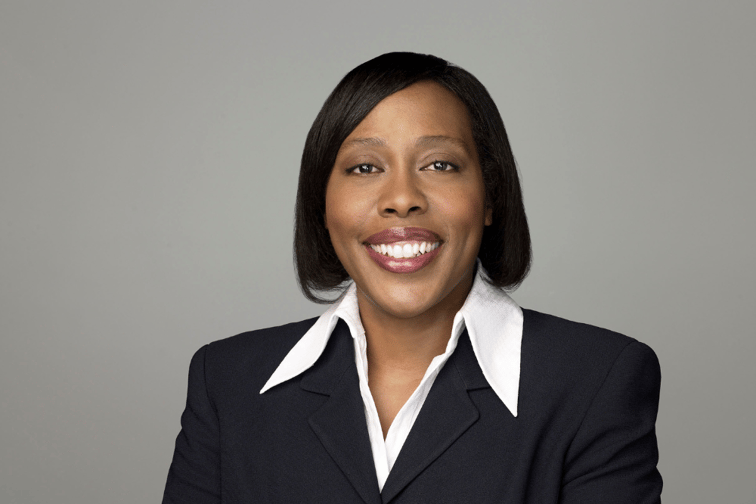

Tamara Franklin (pictured) was once vice president of business development at Turner Broadcasting Systems, Inc., which includes TBS, TNT, CNN and the Cartoon Network. It’s far removed from the insurance industry, but Franklin’s time with Turner generated helpful insights that she now uses as chief digital, data and analytics officer at the global insurance broker Marsh.
“It’s all-around content and consumption, and you would have viewers tell you how they want to view and consume your content, but how they actually viewed and consumed their content was different,” Franklin recalled. “What they do and what they said they were going to do were always two very different things.”
The lesson learned: observe customer behavior and then build out products to meet the need they display.
Franklin has been at Marsh since October 2020, after most recently serving at IBM as its chief digital officer and then vice-president for media and entertainment, industry solutions in North America. At Marsh, Franklin oversees a team of more than 500 people, a mix of contractors and employees that work with Marsh employees, colleagues and clients in equal measure. The digital leadership team has generated 28 patents so far and includes veterans of companies including Accenture, American Express, Aon, Bain, Zurich, Travelers, Sony, JPMorgan Chase and more.
Franklin explains her job as focusing on technology at multiple levels.
“I spend my time really obsessing about ways that Marsh can leverage technologies to solve really difficult business problems for sustainable competitive advantage,” Franklin said.
That means she works with her team and helps shape its efforts to design and implement digital technologies to boost the client experience, and also enhance the use of data and analytics to transform how Marsh supports and serves its clients.
“The end game is [about] how do we apply those technologies in ways that allow us to really take advantage of the wealth of data in the industry and apply it towards our clients’ needs and solving their business problems,” Franklin explained.
Franklin brings to insurance a diverse background, having worked in various industries during times of disruption. She was in the newspaper publishing business, for example, when the internet became prominent, and in telecommunications when it went from analog to digital. Franklin worked in media and entertainment when consumer consumption patterns changed, and the internet became the place where people watched video and consumed social media. Even at IBM, high-tech industries were always undergoing transformation. Joining Marsh at a time when insurtech is gaining strength and prominence felt like yet another moment of disruption, Franklin said.
“In an industry that has been pretty much the same for a long time, it felt like this was an opportune time,” she said.
From her time in media and entertainment and other industries, Franklin is bringing experience and savvy about using data to address customer needs and maximize their experience, and guiding efforts to build digital products and services that help support that goal.
Early on, Franklin said, she has helped bring to fruition three main tech “pillars” since she came on board.
The first is a platform that enables “direct to client” experiences using real time data and analytics.
“It’s a digital experience that allows clients to access the full breadth of their relationship with Marsh and to do so in a collaborative way with their clients,” Franklin said.
The second pillar is a digital broker platform that Franklin said allows Marsh to serve its affinity businesses.
“You can imagine a restaurant franchise operation [where] the chain is our client, but their clients are their franchisees. Those franchisees require access to certain insurance lines at certain levels to be compliant,” Franklin explained. “The digital broker platform allows those franchisees to purchase the right levels of insurance … so they can manage their own restaurants.”
A suite of analytics products represents Marsh’s third platform to come to fruition under Franklin’s leadership.
“We have several items in the portfolio that allow our customers to better understand their risk profile,” Franklin explained.
The analytics platform allows for “what if” scenarios and the chance to view an entire property portfolio, with location map overlays that help identify exposure in terms of weather or other risks. That process, she said, allows a client to think about the portfolio and how its risk appetite might change over time.
Franklin said she hopes to scale all three platforms and nurture the new business they’re capable of handling. One way would be to see how they can serve other business needs and possibly be used for other market opportunities. One potential target: the affinity world.
Overall, she said, there will be a shift to move from marketing individual products to larger-scale platforms, because of the customer scale they can address.
“We’re bringing more players into the ecosystem on to a platform to conduct various business services that drive more revenue,” Franklin said.
In the end, Franklin brings a fresh perspective to the insurance industry, and she said her previous jobs have left her with lessons learned that apply to her Marsh role today.
At Turner, learning that what customers did wasn’t always what they said they were going to do was a revelation in terms of product development, Franklin said. IBM also taught some major lessons.
“What I learned at IBM would be to move fast,” Franklin said. “Get things out of the research lab and out of experimentation into the hands of businesses and real people.”
Franklin noted that IBM was an early experimenter with artificial intelligence [AI] through its Watson program, but that people today would not necessarily consider the company a leader in AI.
“It was a little bit wasted, unfortunately, because [they were] maybe not bold enough to get it out there into the hands of businesses and partner with folks who start tinkering with the technology,” Franklin said. “You can’t sit on it and wait for perfect.”
